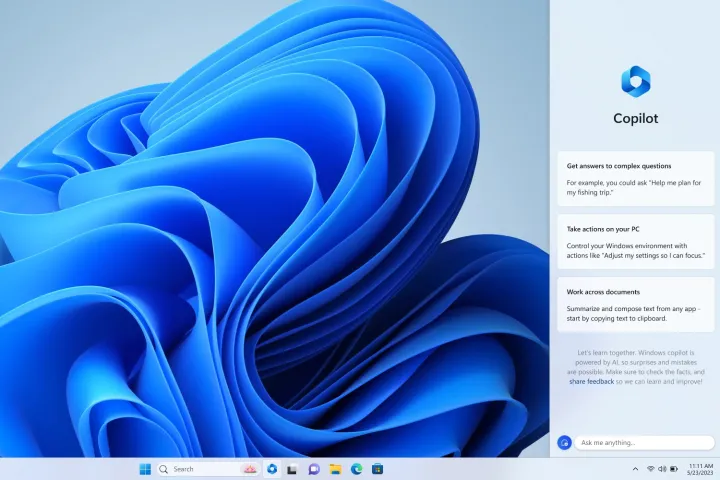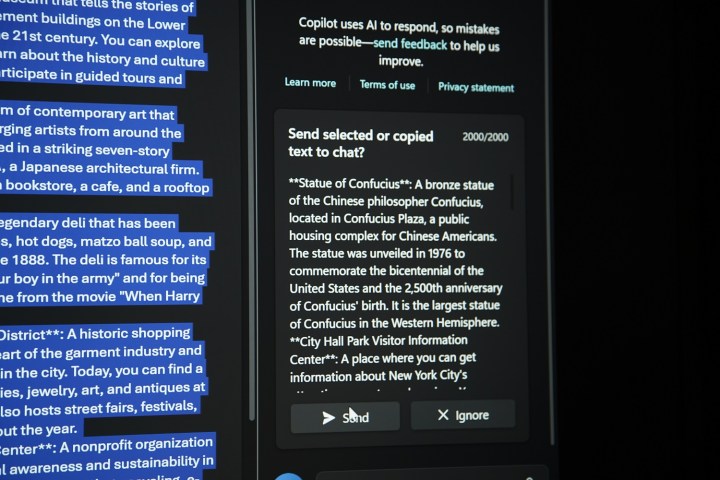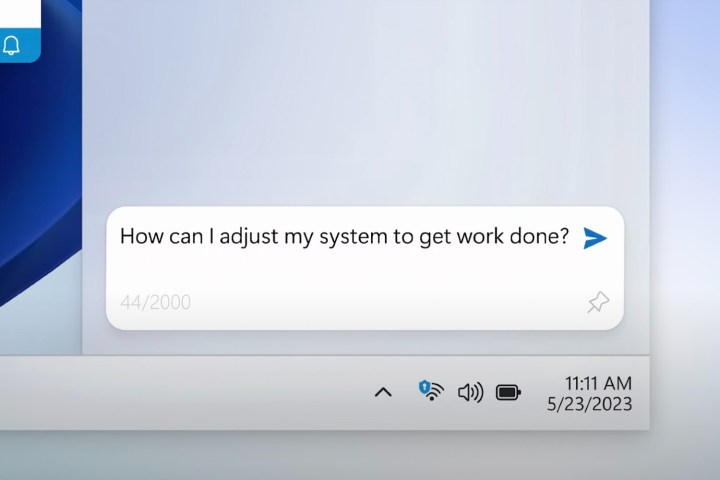A lot of Microsoft’s September event was dedicated to Copilot, Bing Chat, and other AI-driven features. In a way, the updates made to laptops like the Surface Laptop Studio 2 almost felt like an afterthought. It was a real AI fest — and no wonder, as Microsoft has certainly created something bragworthy.
Despite how impressive Copilot seems to be, I can’t see myself actually using it. It’s a neat party trick, but my concerns with the AI outweigh any upsides it might have.
AI everywhere

I’d heard a bit about Microsoft’s Copilot before learning more during the September event, but in my mind, it felt like yet another ChatGPT — fun, but I’ve seen it all before at this point. The last year has been oversaturated with new AI tech to the point where I can feel myself losing excitement at the thought of all these recent developments.
Although it wasn’t the first of its kind, ChatGPT has certainly started some kind of revolution in mainstream media. It blew up to previously unseen heights. People started using it to pen blog posts, write their emails, or do their homework, and it’s a lot more natural to talk to than a simple Google search. Google was quick to follow with Bard, and Microsoft with Bing Chat, but neither made the impression on the masses that ChatGPT managed to achieve.
I have a feeling that Microsoft’s Copilot is going to be the closest thing to ChatGPT that we’ll see for a while — and I don’t mean in terms of capability, but rather in terms of impact.
This thing sounds like it can do a lot. It’s not just going to write your emails for you; it’ll look through your inbox, pick out interesting emails, and summarize them for you. It’ll go through an Excel spreadsheet and pull out interesting data. It’ll learn how to write like you do when it responds to your emails or texts directly from your PC.
And all of that comes bundled into the next big Windows update, launching on September 26. The reach of Microsoft Copilot is going to be on a whole different level than that of, say, Bing Chat. Many people don’t use Microsoft Edge or Bing, and even those who do don’t have those things built into the very foundation of their operating system.
Microsoft Copilot can help you navigate Windows 11 in a way that the (often faulty) search function never could, but it can also help you figure out the recipe for a dish you only have a photo of or solve a geometry problem based off of a Snipping Tool screenshot.
Long-story short — Copilot is going to be big. And I really don’t want it anywhere near me.
At what point does it become too much?

Don’t get me wrong — I embrace the fact that the future of many things lies in AI. Be it certain jobs or various forms of entertainment, AI is going to permeate our lives in a way that could hhave been pulled straight out of The Jetsons years ago. This train is running full speed ahead and there’s no stopping it.
But I draw the line at some of the things Copilot is capable of doing — and it has everything to do with privacy.
I started using the internet in the late 1990s and early 2000s, and privacy wasn’t a concern for almost anyone back then — or so it felt. We were told not to share personal information online, but that was because we were afraid of what other people could do with it. These days, while you should still keep those things to yourself, it’s not just random internet strangers who prey on your personal info. It’s mostly massive corporations.
We hear about various data leaks pretty much every week (even Microsoft is affected). And oftentimes, hundreds of thousands, or even millions, of people are affected. You don’t even need to fall victim to data theft for your data to be misused in some way. Companies thrive on collecting various data about what you like, what you do, what interests you, and what annoys you. This data can later be used to convince you to buy things, but it can also have bigger consequences, such as influencing political- or health-related decisions.
This current online landscape has made me feel pretty jaded about my data, and some of the things that Copilot is capable of — while amazing on the surface — just don’t sit well with me.

I don’t like the idea of any tool having access to everything on my computer. I don’t want anything to be able to read my emails and learn my tone, even if there’s nothing of interest in there and it’s only doing it to help me through my workday. I don’t even particularly like the idea of Microsoft Shopping Copilot, which relies on AI to learn from you and propose the right things for you to buy. It’s like context ads with extra steps, but I always use an ad blocker, and with good reason.
One of the reasons why Copilot is so groundbreaking is that it has access to so much context. It’s not like ChatGPT where you feed it the information you want and it responds to that. It’ll have a view across your apps, your web searches, and your past interactions, all of which serve to help it respond to you more accurately. It’ll also be able to dig through multiple devices, so it’ll feed on everything you want it to, even the things some users may not be aware of in day-to-day usage.
At a time when large corporations use our data not just to spam us with targeted ads, but also to train AI, I’m feeling less and less inclined to participate in that. It’s not even just about data privacy as much as the fact that AI is not this magical thing that some companies will have you believe; it’s equal parts wonderful and terrifying. It can ease our lives and ruin them just as much with capabilities that displace many jobs. Also, if your data ever falls into the wrong hands, things like Copilot will have a lot more of it to give away.
For Microsoft’s part, it says all of this is optional; you don’t have to feed Copilot your data if you don’t want to. Call it a slippery slope fallacy, but companies like Microsoft, Meta, and Google don’t exactly have a great track record with user data. And if Copilot is going to be as pervasive as Microsoft suggests, it’s going to be hard to avoid interacting with the service.
Should I be impressed or scared?

I’m not trying to sound paranoid here. I don’t believe that Microsoft, or any tech giant, is just lurking in the shadows and waiting to steal the contents of my inbox for any malicious reason. It’s a little uncomfortable, though. In the past, data was quietly filed away in a data center and used in an anonymized way to target demographics for advertising. Now, it’s explicitly targeted, attempting to mimic you. Maybe I’m just getting old and taking too much time to embrace change. Who knows?
I can answer my own emails and texts, but I can’t control what happens to my personal data once it falls into the wrong hands. Copilot looks mighty impressive, and I can clearly see the benefits it could have. I’m just not comfortable with the trade-offs that comes with it.
And this is just the beginning. The ChatGPT revolution started less than a year ago and it will only grow from here.
Editors’ Recommendations
Services Marketplace – Listings, Bookings & Reviews